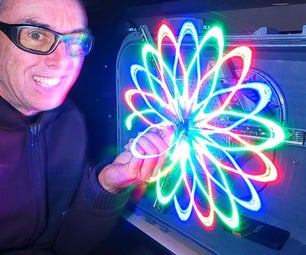Introduction: Realistic Lightning Using Unity 2017 Beginners
In this tutorial, we will create an awesome looking realistic lightning scene shown above in unity using Progressive Lightmapper and post-processing stack.
Make sure you have some basic knowledge of unity interface and a unity3d software on your computer.
You can skip this part if you didn't want to know what is Progressive Lightmapper.
The progressive lightmapper is a path tracing based lightmapper backend that provides baked lightmaps and light probes with progressive updates in the Editor.The progressive lightmapper goes through a short prepare step (geometry and instance updates, G-buffer and chart mask generation) and starts producing the output very quickly. New lightmaps and light probes are shown as soon as a new intermediate result is ready. This allows for a very fast iteration workflow.
Step 1: What You Need
You need unity engine I am using unity 2017.3 to download it go to these link Download now
If you already have unity engine then start from here
After you install unity you need to download Post processing stack
Download this file here
Now you are ready to go.
Step 2: Setting Up Your Project
First, open your unity engine after opening your unity engine you will see a dialog box.
Follow the step in order.
1. Click on Create project
2.Name your project any name
3.Choose the post-processing stack you downloaded earlier
4.Create the project.
Well done you create a unity project
Step 3: Setting Up Folder
Now you see the unity editor in the project you see a folder called post-processing stack which contains post-fx.
1.Click on create you will see a window pop up in which you select folder it is on the top list.
2.Now name it Material
3.Now create the folder for scene and prefabs.
After you created you will see like this as shown on above picture
Step 4: Placing the Environment in the Scene
Now after making folder its time to create the scene.
1.Unzip the downloaded file you downloaded from the first step and drag and drop to prefab folder.
2.Now select the two file and drag to the hierarchy after you successfully put into the scene you will see the result as shown above.
3.Click on the Directional light.
4.Now disable the Directional light.
5.Click on window as shown in the picture
6.Click on lightning
7.click on setting
8.Click on skybox material
9. Click on search box and type none or any random thing to show up nothing
10.And select the nothing
11.You see two 10 sorry my editing mistake and drag the lightning setting window to the location as shown in the image.
Step 5: Making Materials and Putting to the Objects
Now go inside the body you will see very dark and a pink colored object which is due to no lightning in the scene now we will make the material to make the ugly scene beautiful.
1.Now go to the material folder we created
2.Click on create and select material and name it orange.
Again make one material name blue.
3.Now click on the orange material and you will see the properties in the inspector table.
4.Now click on emission
5.And select to backed
6.Click it
7.Choose the color now put the value of color as shown in the picture
8.Now click on orange and drag it to object as shown in picture after you put the material on the object you see the object turns to orange from pink
9. Now click on the inspector and scroll down to light mapper setting section
10.Now choose progressive.
11.You notice that auto-generate is selected uncheck it.
Now I will give you exercise to make a blue colored material like we make above.
12.Now click on body1 on hierarchy
13.Now click on the blue material you created and drag it to the WALL (3).
Step 6: Ready to Baked the Light
Now its time to baked the light
1.Now click on lightning
2.Click on generate lightning
After you click you will see a progress bar wait to complete it can take much time if your computer hardware is slow.
Step 7: Setting Up Camera
After you finish building you will see the result as shown on above
1.Now click on camera
2.And put the values in the transform section as shown in the picture
Step 8: Post Processing Stack
Now after you set up the camera its time for effects.
1.Now Click on asset and click create
2. Choose Post processing profile as shown in the image.
3.Name it as light
4.And you will see properties of the post-processing profile you created and checked the option as shown in the image.
Now we need to put the post profile on the main camera to take effect.
5.Now click on camera
6.Click on add component in the inspector
7.Click on search and type post
8.Now click on post-processing behavior.
Step 9: Final 1
Now Click on light and drag it to the profile as shown above
wow you did it
Step 10: Result
Congratulation you have done this project wow you are great.
You can extend it by putting some lights.
This is my first tutorial on Instructables please support me by voting so I can get the confidence to make more project like this.
My website abhijitahp.blogspot.com and sciinut.blogspot.com

Participated in the
First Time Author Contest 2018

Participated in the
Epilog Challenge 9











